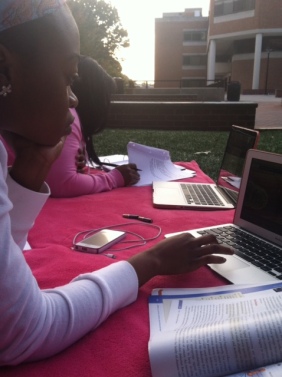Towson University senior Carmen Rivera writes down all of her obligations. Homework assignments, projects, meetings, and anything else that is considered a priority makes its way onto a paper list, the calendar in her iPhone, or turns into an alarm reminder. However, this was not always the case. There was a turning point in the economics major’s academic life that led to her habits today.
“My sophomore year, I got my first C. It may not seem like a big deal looking back, but at the time it was borderline heartbreaking,” Rivera said. “I realized I needed to up the ante and develop those skills to be successful.”
According to Towson U learning specialist Tabatha Beck, time management and procrastination are two major issues that students face, especially transitioning from high school to college. The learning specialists at The Academic Achievement Center (located on the 5th floor of Cook Library) realize this, and try to combat the issue very early on.
“When we do the open houses, we have a sheet that gives the differences [between high school and college] and expectations [of college],” Beck said. “We actually offer workshops online and in person; they touch base on procrastination, time management, study habits, to help students make that transition easier.”
For those who prefer more individualized assistance, one-on-one academic coaching is also available. Towson professor, learning specialist, and academic coach Jeremy Boettinger spoke about the importance of making effective use of free time, and planning in a similar manner that Rivera does. Mapping out your day, week, or even month, is key.
“What I usually have students do—on a schedule either on their phone, their laptop, or pen and paper—some way shape or form get what they have to do every week somewhere where they can visually see it,” said Boettinger.
Using this method, students block out time for classes, non-negotiable commitments (i.e. work), and commute. The hours that are left should be dedicated to studying, but extra activities—the gym, hanging out with friends—can be included here as well. Boettinger says that having a visual representation helps students realize whether or not they have taken on too much responsibility, and that is the reason for their academic struggles, or if they actually have a decent amount of time but are just not utilizing it properly.
Current students are not alone in the time management struggle. Both Boettinger and Beck reflected back to their freshman year of college, and how they experienced the same difficulties.
“I definitely liked to hang out with friends more than actually do work, so I had a lot of study groups,” Beck said.
Studying with classmates and re-teaching the information to others can help you retain information, and is another method that Rivera says works well for her. She also “productively procrastinates. “
“If I am avoiding an assignment, I avoid it by doing another assignment,” Rivera said. “This will usually prompt me to finish everything.”
Even once students begin to use the techniques presented to them by the AAC, technology can still prove to be a large distraction. Former Towson student and 2nd year pharmacy student (P2) at Notre Dame of Maryland University, Alyssia Dyett, emphasizes the usefulness of the Do Not Disturb feature on her iPhone.
“If the phone doesn’t distract me, I find it easier to stay focused and often become so engrossed in my work that I forget to even check my phone,” Dyett said. “I find myself being more efficient with my time without constantly stopping every 5-10 minutes. That time adds up quickly!”
Like Beck and Rivera, Dyett also stressed the usefulness of study groups.
“When I went to undergrad, I learned the value of utilizing the strengths of my classmates to help me succeed. Study groups are a pivotal part of my success.”
Although we should place limits on our social time and technology use, we cannot cut it out completely. In today’s technology age, that would be unrealistic. This way of thinking has brought about a number of online study resources and smartphone apps.
Community College of Baltimore County sophomore, Brett Lavenstein, understands the value of time, and that there are tools readily available on the Internet.
“I have to make sure that time is effective, I won’t read needless chapters from the assigned textbook,” Lavenstein said. “I’ll use small bits of information from the Internet as well as the textbook. I try to go off of the main objectives listed in the course’s syllabus and use Google and YouTube from there.”
Boettinger also recommends YouTube, specifically the Khan Academy channel, as a study aid. He also suggests flashcard making site/app Quizlet, and organizational app Evernote for visual learners, and the Michigan Institute of Technology (MIT) lecture series for visual and/or audio learners.
The Center’s website provides a plethora of links and resources—PDFs, Powerpoints, workshop coverage, etc.—to help anyone achieve their goal of becoming a more efficient student in 2016. One should keep in mind that doing so is a marathon and not a race; it is a goal that is achieved over a long period of time.
“Sophomore year was a wake up call,” Rivera said. “I quickly learned that they (time management and study) were skills that needed to be acquired and not just something I could pick up overnight.”
After her second year at Towson, Rivera realized this, made the necessary changes, and is finishing off her last two semesters strong.
